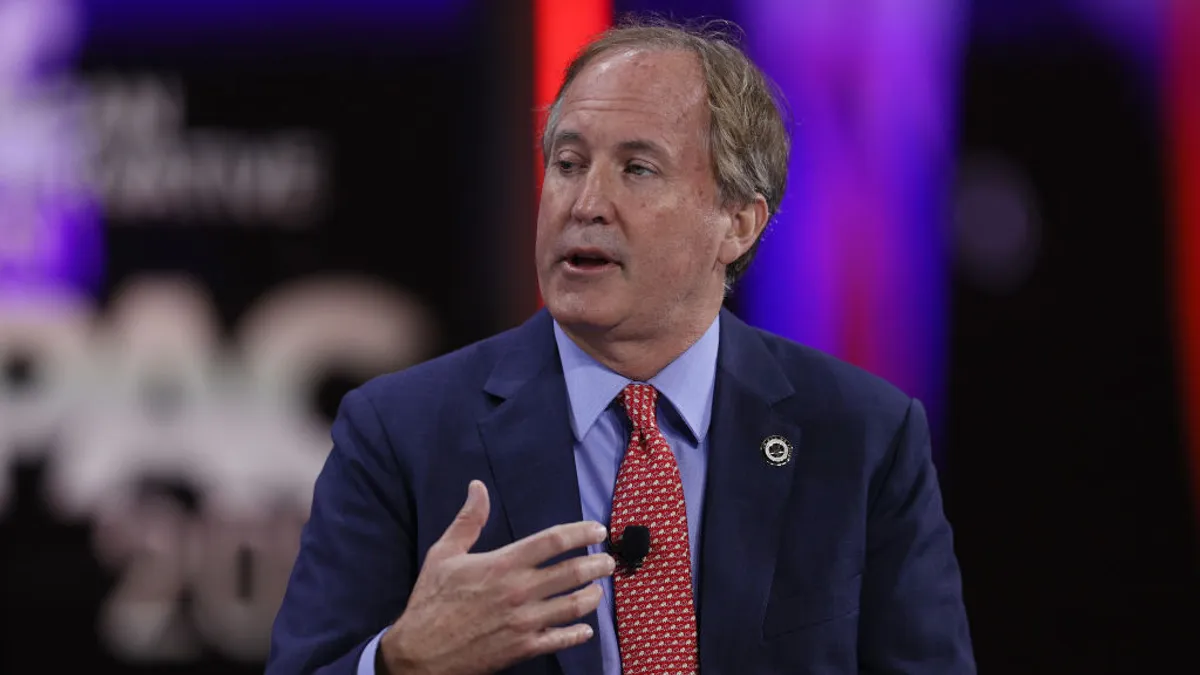Dive Brief:
- Texas Attorney General Ken Paxton is suing chemical manufacturers 3M and DuPont for “failing to disclose health risks and environmental harms” related to their marketing of products that contain per- and polyfluoroalkyl substances, or PFAS.
- Paxton filed the complaint in the U.S. Northern District Court of Texas on Wednesday. The complaint alleged the two chemical manufacturers — along with the subsidiaries that are legally responsible for DuPont’s historical liabilities — engaged in deceptive trade practices related to PFAS-containing products like Teflon, Scotchguard and Stainmaster.
- The lawsuit alleges the companies have known that there were harmful consequences to the “forever chemicals” and continued to market products containing them “for over 50 years.” Paxton’s office called the complaint “a new stage in PFAS litigation,” and is separately seeking to pursue legal action against aqueous film-forming foam manufacturers, according to a Dec. 11 release.
Dive Insight:
3M created two chemicals in the PFAS family — Perfluorooctane Sulfonic Acid (PFOS) and Perfluorooctanoic Acid (PFOA) — in the 1940s, with DuPont purchasing PFOA from 3M in 1951, according to the lawsuit. The complaint alleges that the two companies have known since the 1960s the chemicals caused health and environmental harms and “as early as the 1970s – knew that their PFAS chemistry was already building-up in the blood of most Americans.”
Despite evidence that there was an internal understanding of the potential consequences, the companies continued to use the chemicals in home products like cooking pans and market them as safe, Texas’ attorney general said. Texas is bringing the lawsuit to hold the manufacturers “accountable for deceiving Texans into buying consumer goods without vital information,” Paxton said.
“These companies knew for decades that PFAS chemicals could cause serious harm to human health yet continued to advertise them as safe for household use around families and children,” Paxton said in the Dec. 11 press release.
“Defendants marketed these products in Texas and elsewhere to consumers as having remarkable benefits such as resistance to heat, oil, stains, grease, and water,” the complaint says. “But Defendants knew for much of this time, during which they profited immensely from the sale of their products, that PFAS pose risks to people’s health and impact the environment.”
The lawsuit also accuses DuPont of looking to restructure in order to avoid legal liability for its PFAS manufacturing. A 2012 study funded by DuPont, as a requirement of a 2005 class action settlement, found “probable links” between exposure to PFOA and several diseases, according to the lawsuit. Paxton alleges that, seeing the writing on the wall for its future PFAS liability, DuPont began a multi-year process to spin off the liability.
Paxton alleges DuPont’s spinoff of its performance chemicals business — which includes Teflon and other chemicals — into a separate company, Chemours, was the first step. The next step was a merger with Dow that would shuffle the liability of both of the companies, Paxton said, and also the spinoff of a parent company, Corteva, to assume those liabilities.
However, Paxton noted that the North Carolina Supreme Court has since found that DuPont De Nemours — referred to as “New DuPont” by the suit — and Corteva are both legally liable for DuPont’s historical PFAS manufacturing.
Holding PFAS manufacturers liable for health effects has not been an easy road for litigants. Last year, a federal judge in Ohio dismissed a class-action lawsuit against 3M, DuPont and Chemours and ruled that the litigant’s complaint was too broad and could not tie the PFAS pollution to a specific source.
3M and DuPont did not immediately respond to requests for comment.












